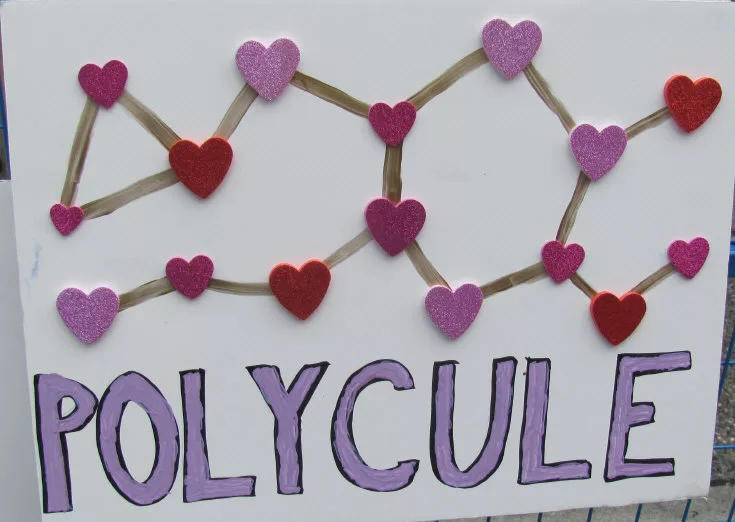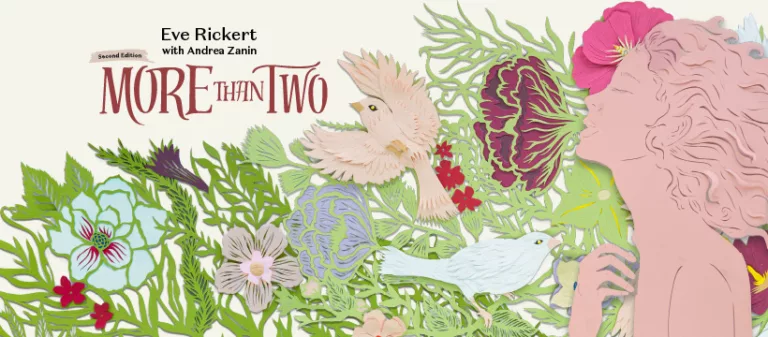This is a guest post by my friend Shelly, who also wrote this excellent guest post on consent. This essay was originally published in January 2014.
“Of course I’ll hurt you. Of course you’ll hurt me. Of course we will hurt each other. But this is the very condition of existence. To become spring, means accepting the risk of winter. To become presence, means accepting the risk of absence.”
― Antoine de Saint-Exupéry, The Little Prince
Winter is coming…
In the morning, I like to drink coffee out of this cheerful winter mug, stare intently at something 2000 miles away and say, darkly, Winter is coming… And then I like to follow it manically with something like, “And then there will be presents!” or “And then we can DECORATE!” I do this partly because, well, it never stops being funny to me, and partly because the change of seasons is really important this year.
Transitions are really important to me right now. Memories are really important to me right now. With full disclosure, I am actually a homunculus.
“I am filled with sawdust!” I keep trying to tell people. “Nothing is there! When I look in the mirror, nothing is there!!!” … *blink*
“SAWDUST!”
And then the other person is like “Paper or plastic?”
It turns out that other people have a lot on their minds.
I thought I would tell you now, though, that I lost myself. No, that’s not right, because that suggests that I might be waiting in security with the lost and found. No, it would be more accurate to say that I demolished myself, and am trying, so slowly, to rebuild myself out of big dreams and little piles of sand.
So now you can determine whether I’m uniquely qualified or massively unqualified to submit this challenge. It’s all the same to me, I just have a story to tell.
We built this city**
When I first met my first polyamorous partner, back in 2002, he was in a strict primary/secondary relationship. His wife was primary, had veto over his relationships, and the two of them had worked out a long list of limitations on his other relationships out of reverence for their marriage.
Be careful about saying things that might be darkly ironic later, because they tend to end up becoming darkly ironic later. “Him?” I would tell my friends who noticed my googly eyes. “Not with a 10-foot pole.” What I meant, of course, was “I think I will go about rapidly falling in love with him despite my better judgment.”
When you knowingly enter into a restricted relationship and then suffer over those restrictions, it’s hard not to feel like a total boob. Seriously, no matter how bad the pain gets, there’s always going to be a mocking voice that says “Seriously? You signed up for this. What did you think was going to happen?”
But, see, that’s actually an interesting question. What did I think was going to happen? What I thought I was signing up for was an emotionally restricted relationship. I thought that the risk was the same risk you have in any emotionally restricted relationship: unreciprocated investment and unrequited love. Sure, it hurts, but then it burns itself out because nothing feeds it.
But primary/secondary structures tend to leave a special kind of emotional wreckage. While I freely admit that it is often a mutually beneficial model for all involved, there is a hidden trap. Because sometimes we walk into this structure, with heart in hand, and sometimes our partner meets us there. And then the structure becomes a maze of slamming doors and booby traps. When your partner meets you with real intimacy and love within an externally enforced and non-negotiable framework of limitations, the emotional experience of the relationship is of being simultaneously pulled in and violently shoved out. The cognitive dissonance is even worse. Self-advocacy is often interpreted as homewrecking, and disruptions to the status quo are seen as a hostile act. Remember, you signed up for this, you’re breaking the contract, you’re the bad guy. But don’t be cruel and break his heart, don’t be disruptive and speak for your own. just… just want something else, feel something else, BE SOMEONE ELSE.
So, there is a special place, at the bottom of all of that, where you realize that the only truly “right” thing you can do is just… find a way to disappear. But not with an explosion (you drama queen). Just find a way to disappear quietly so that no one notices. Do the right thing and just… go away.
But then, somewhere in that mess my partner held his hand out to me and said. “Maybe it’s not you, Shelly. Maybe there’s nothing wrong with you. Maybe there’s something wrong with the structure.”
Like most things, primary/secondary works great, you know, until it doesn’t. And it does actually matter how we handle that.
** How long was Jefferson Starship running through your head? Yeah, I did that on purpose.
An answer to the question
Can I just take a moment to call attention to the fact that we are all making this up as we go along?
I remember reaching for the words to describe what I was searching for in poly. An image in my mind of shared experiences and shared love, of voices in the kitchen, of shared meals and lots of feetsies under the covers. Family.
Family was a word I struggled to find and then struggled to define. But it was also an answer to the question that remained when I walked away from forced hierarchical relationships. Family was an answer to the question of loss. How do we stave off loss in poly? It’s like when you’re a vegetarian and someone looks at you sadly and says “what do you eat?” because all they picture is canned green beans and a slice of Wonder Bread. “Why would you be poly? You just lose time and resources and security.” But…but…do you realize that there are like five kinds of animals that we regularly eat, and, like, literally a kazillion other kinds of foods? I just. Argh!
What about going to a movie with your partner and your metamour? Or hell, your partner is out and you just call your metamour up? What about group dinners and big parties and ALL the cuddles and always having someone there for you because you have many points of failure instead of one, and (bom chicka) group sex and… just ALL THE DIFFERENT FOODS?
Family.
Family is a counter to zero-sum arguments.
It boils down to this:
- The objection: Poly is bad because it means you have to divide all your time up and everyone gets less.
- The response: Well, that’s true if you think of relationships as zero-sum. However, that ignores the possibility that you could spend your time with more than one person and then everyone gets more.
I remember long conversations with my partner where we talked about this idea of family, of sharing a life together. And the more he and I developed this dream, the more his wife dug in to preserve the life they had built, where he could only live with her, could only be primary with her. And the more I pushed this dream of family, and eventually did move in.
But, wait, hold on. Before I sell you this Cadillac, I really feel compelled to warn you that it blows up sometimes. No, really. Hold on.
The demolition
Consent is something I’ve become deeply concerned about, both personally and culturally. While consent is something most people associate with sex, I think consent is important for every kind of personal boundary. This isn’t just a philosophical musing, and it’s not even really an ethical one. I care about this because weak boundaries and consent violations degrade the self. No, really. Let’s sit with this. Your self? That’s it. That’s what you’ve got. That’s all you’ve got. Degradation of the self is a living death.
I say this as someone who happily, righteously participated, for years, in coercive relationship structures. I architected some, defended others, used them as weapons and ultimately sacrificed my self for them.
My partner and his wife eventually separated. And it certainly was not a matter of him choosing me over her. He chose one dream over another, one life over another. And I felt with self-satisfaction that I had won some kind of poly moral victory. Because inclusiveness was right and exclusiveness was wrong.
I look back, with a non-trivial amount of horror, at the fact that—even as I felt that my partner’s wife was trying to coerce him into one kind of life—I was trying to coerce her into another. How often does it happen when someone ends up in the intractable center of a miserable V (or star), that they start to search for some kind of moral basis to make a decision (because it’s just not OK to do anything that resembles leaving one relationship for another)? How often is that moral basis “I’m going to choose the person who is most inclusive, and I am going to leave the person who is, well, trying to set boundaries?”
… Family 🙁
We differentiate polyamory from cheating by the honesty, the openness and the consent. The desire for transparency in our relationships, the pull towards inclusiveness and shared time, and the emphasis on metamour relationships and communication, I think, all emerge from these principles. And these are good things. However…
When we take the principles of inclusiveness and family in nonmonogamy to the point where we build relationships that are dependent on other relationships, we are building on a foundation of coercion. Note that I am not saying that these relationships are automatically coercive, only that it’s built in. It’s that room at the back of the house you never use, you know, until you do.
What do I mean by a relationship that is dependent on another relationship? An example might be a triad where one person must be involved with the other two people, or else they can’t be involved with either one of them. Another example might be a V where there is an understanding that one or both relationships will fail if the metamours don’t “get along.” Or perhaps there are many relationships, and if you removed group time, there just wouldn’t be enough time to maintain them all.
Many (most?) poly relationships have relationship interdependence either as subtext or as an explicitly stated criterion. Why? Because time and energy are limited, the idea of family is compelling, and it just doesn’t seem like too much to ask. And if everyone is onboard with the idea, it doesn’t seem like it should be a problem.
And, like most things, group poly works great until it doesn’t. But when it stops working, it seems to create amplified feelings of betrayal and fear, and uniquely powerful emotional hostage situations. I think this is because conflict and change in one relationship typically have a cascading effect.
If I can’t share a home with my metamour, does it mean I can’t share a home with my partner? If I don’t want to spend time with my metamour, will I lose all of my time with my partner? If I break up with my partner, will I lose the support of my metamours? If I stop having sex with one partner, will our shared partner shun me? Does my dyadic relationship even exist outside of the group? Are my feelings enough to make choices, or does this need to go to committee? If I am just generally uncomfortable and need to back off of a shared intimacy, will I be demonized and shamed? If I’m not comfortable in the group, does it mean I’m not really poly? Will my withdrawal be used to build a case to eject me?
And if your romantic network is also your primary social support network—your family—then it massively amplifies disapproval and threats of loss. Social shaming and rejection can create a crippling threat that all but removes choice. If you get into an argument with your partner, and your partner says “you’re selfish and inconsistent and hurtful,” that’s pretty rough. And then you reach out to friends and family, who are essentially your metamours, and they say “how could you do that to him… you don’t care about anyone but yourself,” and then you spiral into fear and isolation and shame, and then your partner says “look what you’re doing to us, you hurt all of us,” and you feel banished and ostracized, it really takes the original conflict to an entirely different level.
When you enter into a group, knowing the contingencies that exist and the terms under which you are approved… when you enter into a group knowing you should really just be grateful for the opportunity, and then you suffer for your loss of control, and for your inability to create the life you need to feel nourished and safe, well it makes you feel like a bit of a boob. And by “boob” I mean double agent, slimy salesman pulling a bait and switch, manipulative homewrecker, monster, monster, MONSTER. Holy fuck, woman, mean what you say and say what you mean, what did you think was going to happen?
And when you really really want to make it work, despite Shakespearean levels of unhappiness, because it should work, it’s easy to start to feel like the only solution is just to try to change who you are. Just crush all of the things inside of you that aren’t working, all the things that are hurting and hurting everyone else, and just… hope something better is left.
(Hi. You there. The one crying. Let’s forget about all of those other people for a minute. Don’t do it. You won’t like what’s left, and you may never recover. And it won’t work anyways. Hey. Maybe it’s not you. Maybe it’s nobody. Maybe it’s just the structure.)
The heartbreaking thing, I believe, is that emotional blackmail is just built into some relationship structures. Abuse doesn’t require an abuser. Sometimes all it requires is a belief.
But don’t worry. For the most part none of this will be a problem… until it is.
The foundation of consent
I believe, pretty firmly at this point, that the foundation of a non-coercive poly relationship has to be the ability to drop to zero-sum at any time, for any reason. That’s not just true for sexual relationships in a group, but also for metamour relationships. But more than that, the foundation of consent is a built-in exit clause for every single relationship. Not happy? Not healthy? It’s OK to leave.
To that end, I’ve decided there’s a bunch of coercive bullshit that has to go.
If you need more from our relationship than I can give,
it is not because you
- are insecure/too needy
- don’t care about your metamours
it is not because I
- am selfish and greedy
- am neglectful and irresponsible
if you need more from our relationship than I can give, then we have a resource incompatibility and we need to determine A) whether that resource is required for our relationship to stay intact, or B) whether it is a general resource you are missing that can be supplemented elsewhere.
If it is amenable to creative problem-solving, let’s try to solve it. If it is not, then it’s OK to end the relationship.
If I am not comfortable sharing any kind of intimacy with your other partners,
it is not because I
- am trying to cowgirl/cowboy you
- am not really poly
- am not really trying
If I am not comfortable sharing intimacy with your other partners, and that takes us to unacceptable levels of resource scarcity, then A) I hope we didn’t build a deeply attached and committed relationship based on coercive intimacy because B) these things aren’t sustainable, and this is going to hurt.
The reconstruction
We have the opportunity to re-invent relationships. We will mess up. Things that really make sense and seem right, even righteous, might have hidden explosives. It matters what we do when things go wrong. We should not assume first that our relationship expectations are right and our loved ones are broken. We should assume that we will make bad choices, build bad structures, and subscribe to damaging beliefs. We should be willing to question all of them. We will be blind to many things until we are not. We need to admit that sometimes there are no solutions, that sometimes relationships should end or change, and sometimes it won’t be fair. Relationships require maintenance, resources are limited, and so is love. It’s ok. Follow your heart, honor your own humanity and that of the people around you. Do your best. Show yourself compassion even when, especially when you’re the only one who is.
There are no good people or bad people here. We only risk becoming something static when we decide that we’ve got it all figured out and that our moral code can be absolute. We will all do good things and bad things, and we will all hurt the people we love. Sadly, we will probably hurt them the most in the service of what we believe is right. What makes you good is not perfection in action or strictness to code, but the willingness to question, to change, and to listen to your heart when your life stops matching it.
In the last 12 years, I have watched all of my poly dreams go up in smoke. And what I seem to be left with, in the rubble and ashes, is just a poly life.
And I’m sorry. But you will lose some things. You will lose quite a bit of security. Stuff is going to change, and no one is going to be able to predict how. You’re going to have ideas and you’re going to build structures and it’s really going to matter what you do when those stop working, because they will. Some things might end. Everything might end. But if everyone still sees the humanity in everyone else at the end, then that is no minor victory. That’s my pitch. If you’re not ok with this, then please don’t do it.
But if you do, you might find a little bit more of your self. And at the end of the day, that’s really all you’ve got anyways, and, hey, you are amazing.

Like what you’re reading? Buy my book!



